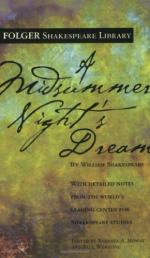|
This section contains 6,365 words (approx. 22 pages at 300 words per page) |

|
SOURCE: Hutton, Virgil. “A Midsummer Night's Dream: Tragedy in Comic Disguise.” Studies in English Literature 1500-1900 25, no. 2 (spring 1985): 289-305.
In the following essay, Hutton explores the religious and philosophical issues which he claims Shakespeare deliberately raised in A Midsummer Night's Dream.
Even though the seriousness of A Midsummer Night's Dream has long been getting its due, T. Walter Herbert is the only critic to treat at length the metaphysical implications as the dominant concern of the play. A rapid survey of the criticism of the play reveals an early concentration on the theme of love, which, with Barber's rejection of love as the play's major motif, gradually yields to a stress on the theme of art (perhaps climaxing with Young's view of the play as Shakespeare's Ars Poetica), which in turn may, under the provocation of Herbert's study, shift to a probing of the play's metaphysical dimensions.1 Herbert...
|
This section contains 6,365 words (approx. 22 pages at 300 words per page) |

|


